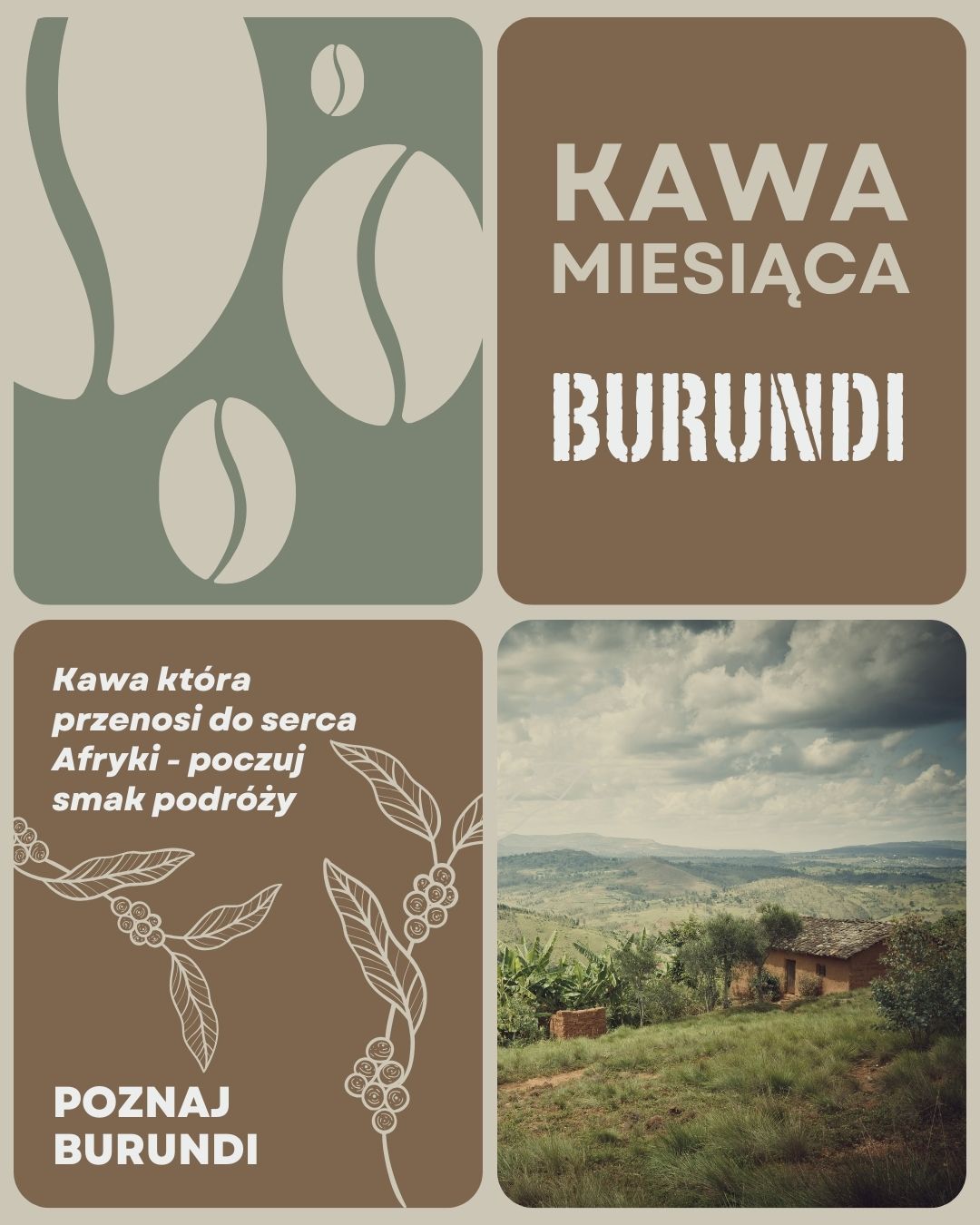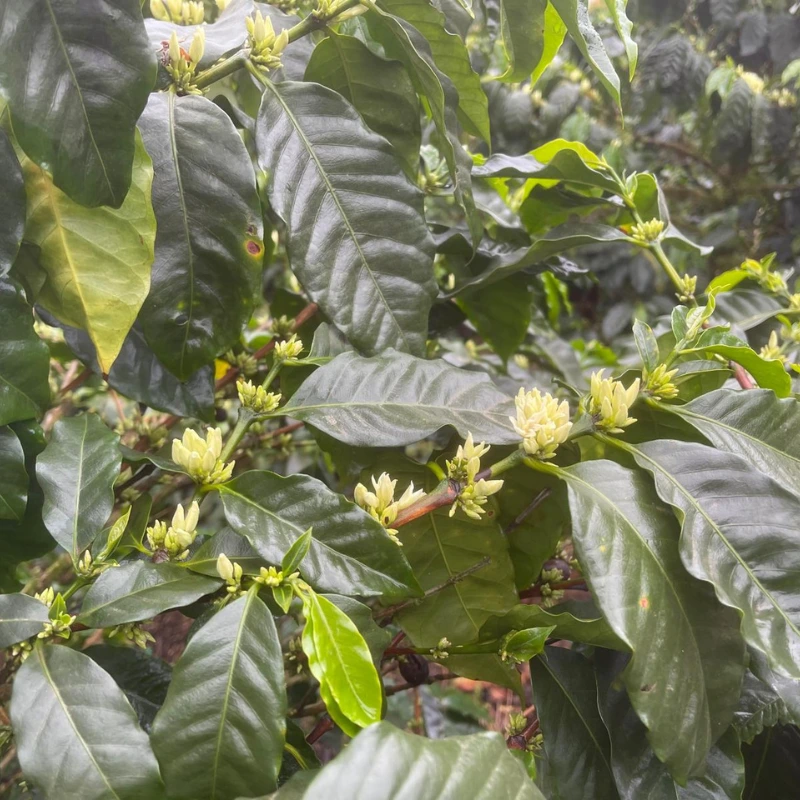Burundi – Coffee from the Heart of Africa Conquering the World

Burundi – Coffee from the Heart of Africa Conquering the World
If you are a fan of specialty coffee, sooner or later, you will come across coffee from Burundi. It’s one of those countries that doesn’t immediately come to mind when we think of the best coffee regions, but I assure you – it’s worth getting to know these beans better. In my work as a barista, I’ve had the opportunity to try many batches of Burundian beans, and every time, I discovered something new. Today, I’m taking you on a journey to the heart of Africa, where small farms and family cooperatives produce coffee with unmatched character.
Burundi Coffee – History and Tradition
How Did It Begin?
Burundi is a small country in East Africa, bordered by Rwanda, Tanzania, and the Democratic Republic of Congo. Although its area is relatively small, volcanic soils and high-altitude plantations create ideal conditions for growing coffee.
The first coffee plants appeared in Burundi at the beginning of the 20th century, thanks to German colonizers and later the Belgians. For decades, farmers primarily grew the Bourbon variety, one of the most valued in the specialty world. It wasn’t until recent years, after periods of political and economic turmoil, that Burundian coffee began to gain its rightful place on the world stage.
The Importance of Coffee for Burundi
Today, coffee is one of the country’s main sources of income – according to data, about 600,000 families rely on coffee farming! Interestingly, most farms are small, family-owned, often not exceeding one hectare in size. This translates into a great attention to quality – farmers pick the fruit by hand, selecting only the ripe and best ones. It’s a bit like home cooking – the more heart you put into preparing a dish, the better the result!
Growing Conditions – Terroir of Burundi
If you’ve ever tried coffee from Ethiopia or Kenya, you surely know how diverse and distinctive African beans can be. Burundi, although less well-known, definitely holds its ground in this regard. What makes coffee from Burundi taste so exceptional?
Climate and Soil
Burundi is located in the coffee belt, which means it’s in the perfect altitude range for growing high-quality Arabica – from 1200 to as high as 2000 meters above sea level. Volcanic soils and a humid tropical climate provide the beans with a rich mineral composition and slow maturation, which results in a more intense flavor.
Small Farms, Great Quality
What sets Burundi apart from other coffee-growing countries is the exceptional care with which farmers tend to their crops. There are no large, industrial plantations here – every harvest is the result of manual labor and years of experience. In many cases, coffee is grown in an agroforestry system, under the shade of banana and avocado trees, which additionally protects the plants and improves their quality.


Processing the Beans – How Flavor Is Created
When thinking about the flavor of coffee, we often focus on the country of origin and the botanical variety. But did you know that the method of processing the beans has a huge impact on the final profile? In Burundi, three methods dominate:
-
Washed Processing (Wet Process) – This is the most common and highly valued method in the region. This process emphasizes a clean flavor, high acidity, and fruity notes. If you like coffees with a distinct, tea-like finish, this is for you!
-
Natural Processing (Dry Process) – This is less common in Burundi but increasingly popular among modern specialty roasters. Drying the whole fruit gives the coffee an intense sweetness and notes of red fruits. It’s a great choice for those who seek less acidic, more dessert-like coffees.
-
Honey Processing – A middle ground method, where some pulp remains on the beans during drying. This gives the coffee a balance between clean flavor and sweetness. It’s the “golden road” between washed and natural processing.
Sensory Profile – What to Expect?
So, what is the flavor profile of coffee from Burundi like? Should we expect citrus notes, stone fruits, or delicate floral accents? Let’s take a closer look at this unique sensory experience. I remember the first time I tried a well-roasted coffee from the Kayanza region – it felt like drinking jasmine and apricot tea, while also sensing subtle chocolate notes on the finish. Such a combination is a true treat for the taste buds!
The most common notes in Burundi coffees are:
-
Stone fruits – apricots, peaches, cherries.
-
Citrus fruits – orange, mandarin, lime.
-
Floral aromas – jasmine, rose.
-
Tea-like finish – especially in washed coffees.
Thanks to these characteristics, coffee from Burundi works wonderfully in alternative methods like Chemex, V60, or Aeropress.
Ecological and Ethical Aspects
If you care about where your coffee comes from, you’ll be interested in the aspect of sustainable production. Burundi is a country where fair trade and direct trade initiatives are becoming more common. This means that when you buy coffee from trusted suppliers, you can be sure that farmers receive fair wages and that the cultivation processes do not harm the environment.
Many cooperatives use organic techniques and minimize the use of chemicals, which also impacts the purity of the taste and the ecological character of the coffee.
How Best to Brew Coffee from Burundi?
Alternative Methods
Coffee from Burundi tastes best when brewed using alternative methods. If you want to highlight its citrus-floral profile, try Chemex or V60 – these methods emphasize the delicacy and complexity of the flavor.
Espresso? Why Not!
Although not every specialty coffee works well as espresso, Burundi can be a great choice if you enjoy fruity and fresh coffees. When combined with milk, it can result in a sweet apricot dessert-like effect!

Summary – Is It Worth Trying?
Absolutely! Burundi is one of those places that’s not yet as mainstream as Ethiopia or Colombia, but its coffees are truly impressive. If you’re looking for new, exciting flavors, it’s time to invite Burundi into your cup!
And if you’re unsure where to find good beans – check out our offer at the Gdańsk Coffee Roastery. We have something special for true coffee explorers! ☕

